Critical Analysis of Curriculum Concepts in Secondary Education
Module handbook for the course 'Exploring Teaching and Learning' at the University of Huddersfield.
29 Pages9021 Words407 Views
Added on 2023-04-25
About This Document
This study critically analyzes the curriculum concepts in secondary education, with a focus on the English language. It discusses the impact of hidden curriculum factors such as hierarchy, power, values, labeling, stereotypes, and confidence on the learning process. The study also explores the role of professionalism in education and the challenges faced by teachers in implementing effective teaching plans. The implications of the study are derived through a systematic analysis of the entire study.
Critical Analysis of Curriculum Concepts in Secondary Education
Module handbook for the course 'Exploring Teaching and Learning' at the University of Huddersfield.
Added on 2023-04-25
ShareRelated Documents
Running head: CRITICAL ANALYSIS OF CURRICULUM CONCEPTS
CRITICAL ANALYSIS OF CURRICULUM CONCEPTS
Name of the Student
Name of the University
Author Note
CRITICAL ANALYSIS OF CURRICULUM CONCEPTS
Name of the Student
Name of the University
Author Note
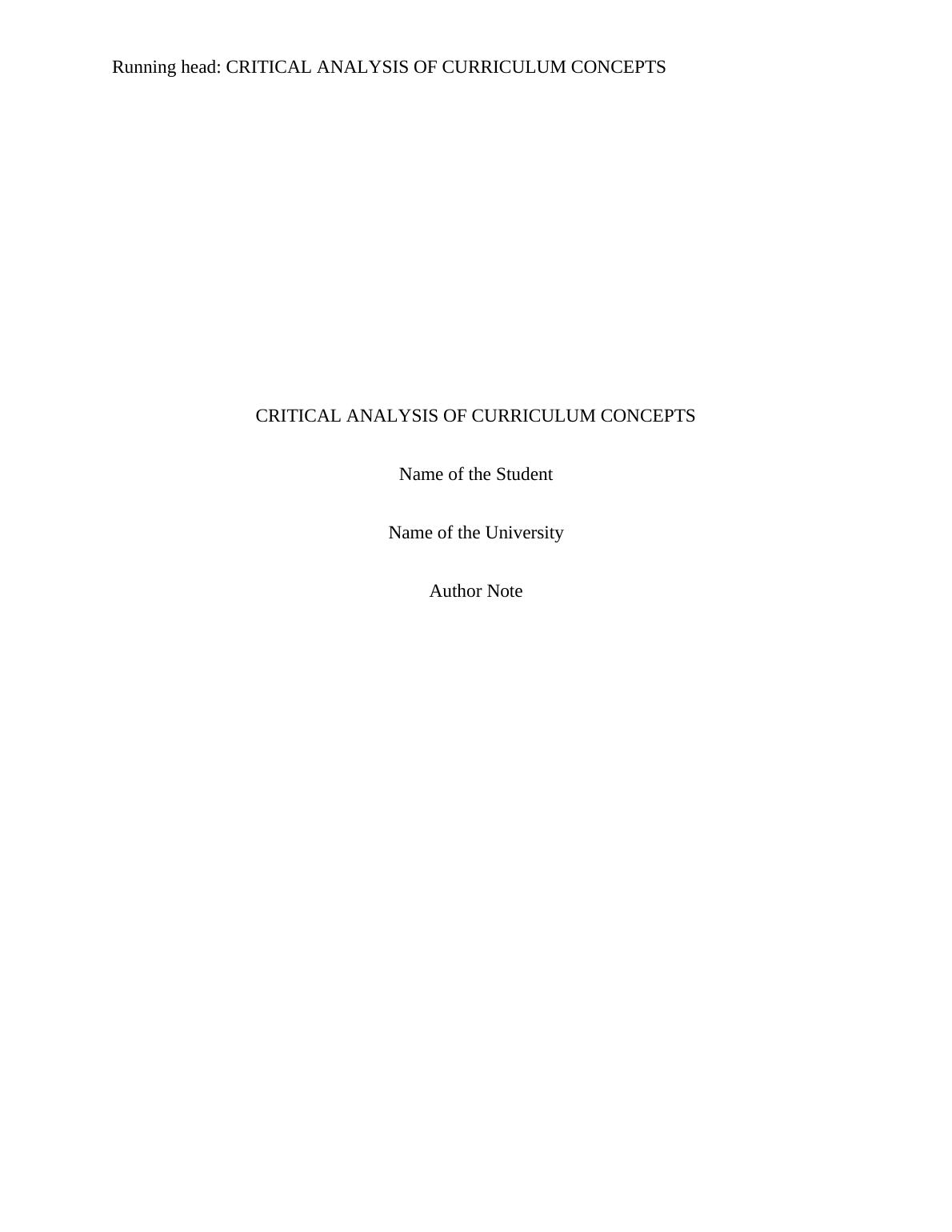
1CRITICAL ANALYSIS OF CURRICULUM CONCEPTS
Table of Contents
Introduction: the educational setting context...................................................................................2
Discussion of curriculum concepts..................................................................................................4
Critical exploration of professionalism...........................................................................................9
Critical analysis of effective teaching and learning.......................................................................12
Conclusion.....................................................................................................................................14
References......................................................................................................................................18
Table of Contents
Introduction: the educational setting context...................................................................................2
Discussion of curriculum concepts..................................................................................................4
Critical exploration of professionalism...........................................................................................9
Critical analysis of effective teaching and learning.......................................................................12
Conclusion.....................................................................................................................................14
References......................................................................................................................................18
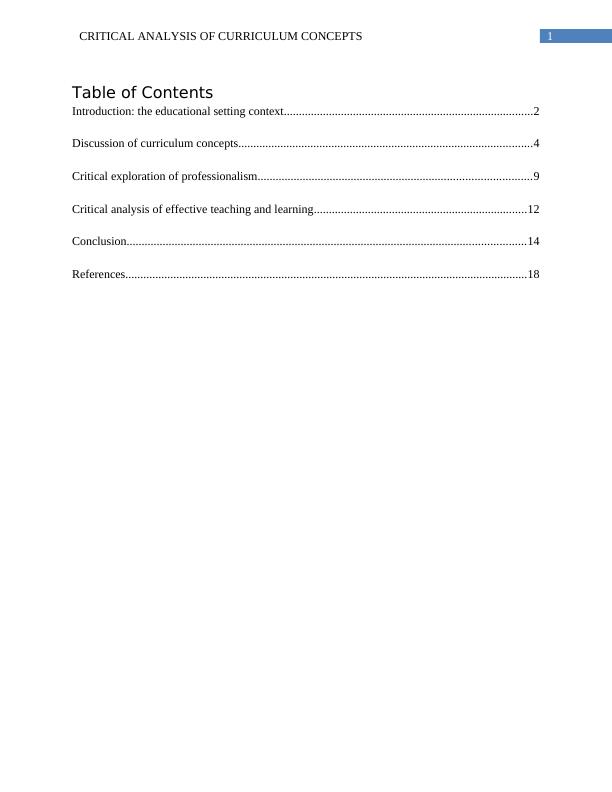
2CRITICAL ANALYSIS OF CURRICULUM CONCEPTS
Introduction: the educational setting context
The study focuses on the various diverse aspects that tend to affect the curriculum of
various educational settings. The setting that is the focus of the study is secondary school
education. There is a need to evaluate the significant aspects of curriculum that is implemented
across the secondary schools for the better development of the students. Secondary education
comes directly after primary schooling. Secondary education in schools essentially take into
consideration the learning requirements of students between eleven to sixteen years of age after
which students usually graduate into either upper secondary or middle schools. This is an
important phase of the academic life of the student that acts as a kind of intermediary phase
between the primary and the higher education of the students. Students develop essential
knowledge base about the various subjects at this point in time in their academic lives. There are
mainly three core subjects at this phase of education. They are Mathematics, English including
literature and science. Science includes the study of Physics, Chemistry and Biology. There are
also subjects that are considered as the foundation subjects. These subjects range from music, art,
computer science to drama, PE, etc. Moreover, there are certain other subjects which students
chose as additional subjects. Hence, the curriculums are developed giving much importance to
these subjects through various phases. The students need to learn better and perform better at the
same time in order to prepare themselves for higher education (Illeris, 2018). The most important
aspect that needs to be developed by the students in this part of their academic endeavors is
generating greater understanding of the core subjects. This helps them to gain significant
momentum with respect to their school education.
The role of the English teacher is highlighted in this setting. The role of an English
teacher concerning this phase of the academic lives of the students is very important as both the
Introduction: the educational setting context
The study focuses on the various diverse aspects that tend to affect the curriculum of
various educational settings. The setting that is the focus of the study is secondary school
education. There is a need to evaluate the significant aspects of curriculum that is implemented
across the secondary schools for the better development of the students. Secondary education
comes directly after primary schooling. Secondary education in schools essentially take into
consideration the learning requirements of students between eleven to sixteen years of age after
which students usually graduate into either upper secondary or middle schools. This is an
important phase of the academic life of the student that acts as a kind of intermediary phase
between the primary and the higher education of the students. Students develop essential
knowledge base about the various subjects at this point in time in their academic lives. There are
mainly three core subjects at this phase of education. They are Mathematics, English including
literature and science. Science includes the study of Physics, Chemistry and Biology. There are
also subjects that are considered as the foundation subjects. These subjects range from music, art,
computer science to drama, PE, etc. Moreover, there are certain other subjects which students
chose as additional subjects. Hence, the curriculums are developed giving much importance to
these subjects through various phases. The students need to learn better and perform better at the
same time in order to prepare themselves for higher education (Illeris, 2018). The most important
aspect that needs to be developed by the students in this part of their academic endeavors is
generating greater understanding of the core subjects. This helps them to gain significant
momentum with respect to their school education.
The role of the English teacher is highlighted in this setting. The role of an English
teacher concerning this phase of the academic lives of the students is very important as both the
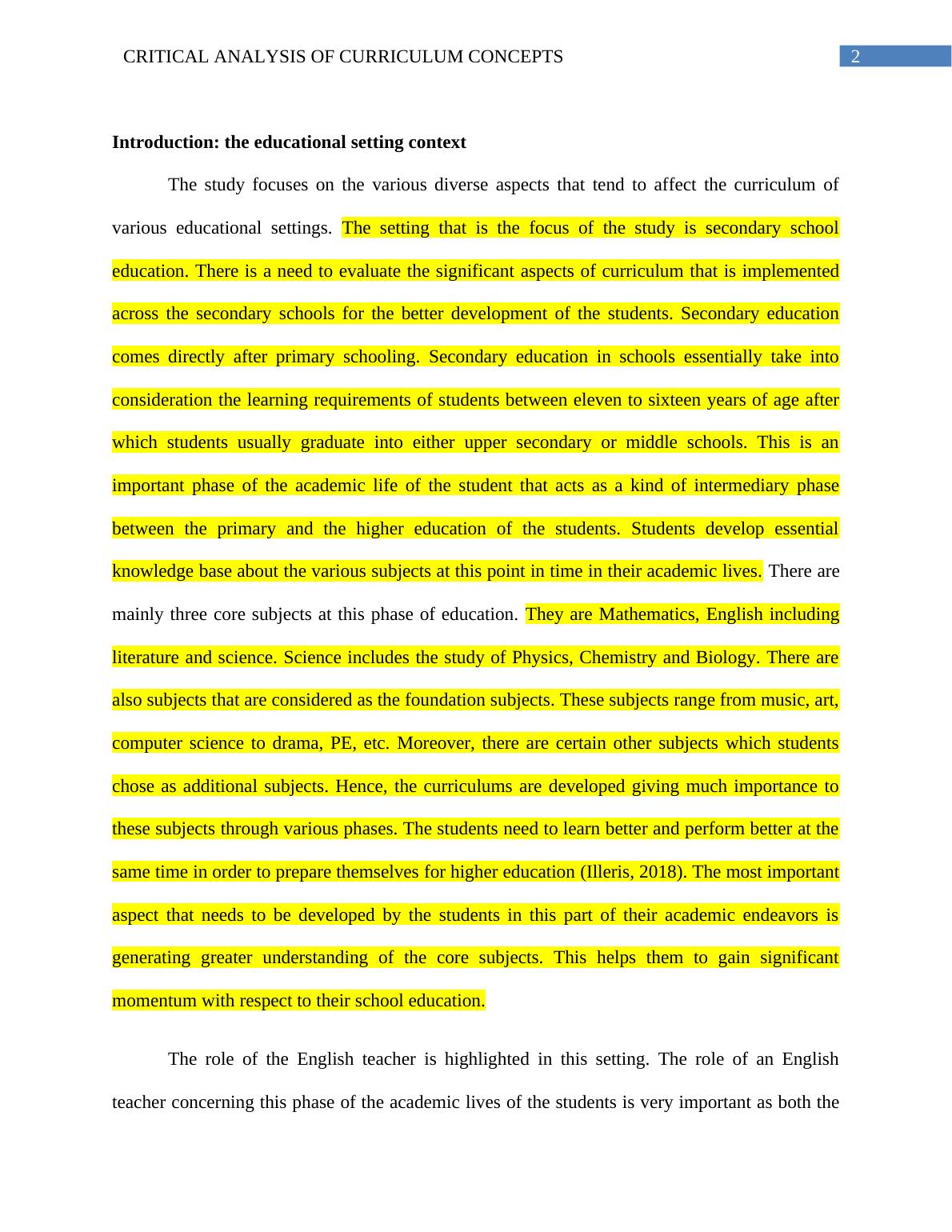
3CRITICAL ANALYSIS OF CURRICULUM CONCEPTS
speaking, reading and understanding abilities need to be essentially developed among the
students (Wyse et al., 2013). The major issue that arises concerning this role is helping students
learn all the different aspects of the language despite having a smaller scope of teaching within a
larger curriculum framework that covers various other subjects. This necessitates the
implementation of strong plans that are focused towards making the learning process easier and
compact at the same time. Moreover, there is a growing process of optimally integrating English
learning with the learning of the other subjects for the significant development of the students.
There is however a significant lack of teachers that is being witnessed across the various schools.
This contributes to the greater responsibility of the teachers. The role requires the ability to
develop effective plans for teaching the students. Additionally, there is room for implementing
more innovative approaches to teaching in the curriculum. This is mostly required to make the
students learn more effectively as quickly as possible. Apart from the requirement of effective
planning, the role requires excellent verbal and written communication. This can help in better
management of the students and guiding them in more effective ways. The teachers are required
to help the student attain a certain degree of efficiency in their study techniques. The teacher
should also have good understanding of the subject himself and develop ever better
understanding in the process.
The assignment will require the systematic critical analysis of the various aspects that are
related to curriculums. The overview and the introduction of the concept is provided at the
beginning. Moving forward, the concepts that comprise the curriculums are discussed. In this
section the most important factors that will be discussed are hierarchy, power, values, labelling,
stereotypes and confidence and their significant impact. The factors such as culture, politics and
laws on the same will be essentially discussed. Moving forward the following section will
speaking, reading and understanding abilities need to be essentially developed among the
students (Wyse et al., 2013). The major issue that arises concerning this role is helping students
learn all the different aspects of the language despite having a smaller scope of teaching within a
larger curriculum framework that covers various other subjects. This necessitates the
implementation of strong plans that are focused towards making the learning process easier and
compact at the same time. Moreover, there is a growing process of optimally integrating English
learning with the learning of the other subjects for the significant development of the students.
There is however a significant lack of teachers that is being witnessed across the various schools.
This contributes to the greater responsibility of the teachers. The role requires the ability to
develop effective plans for teaching the students. Additionally, there is room for implementing
more innovative approaches to teaching in the curriculum. This is mostly required to make the
students learn more effectively as quickly as possible. Apart from the requirement of effective
planning, the role requires excellent verbal and written communication. This can help in better
management of the students and guiding them in more effective ways. The teachers are required
to help the student attain a certain degree of efficiency in their study techniques. The teacher
should also have good understanding of the subject himself and develop ever better
understanding in the process.
The assignment will require the systematic critical analysis of the various aspects that are
related to curriculums. The overview and the introduction of the concept is provided at the
beginning. Moving forward, the concepts that comprise the curriculums are discussed. In this
section the most important factors that will be discussed are hierarchy, power, values, labelling,
stereotypes and confidence and their significant impact. The factors such as culture, politics and
laws on the same will be essentially discussed. Moving forward the following section will
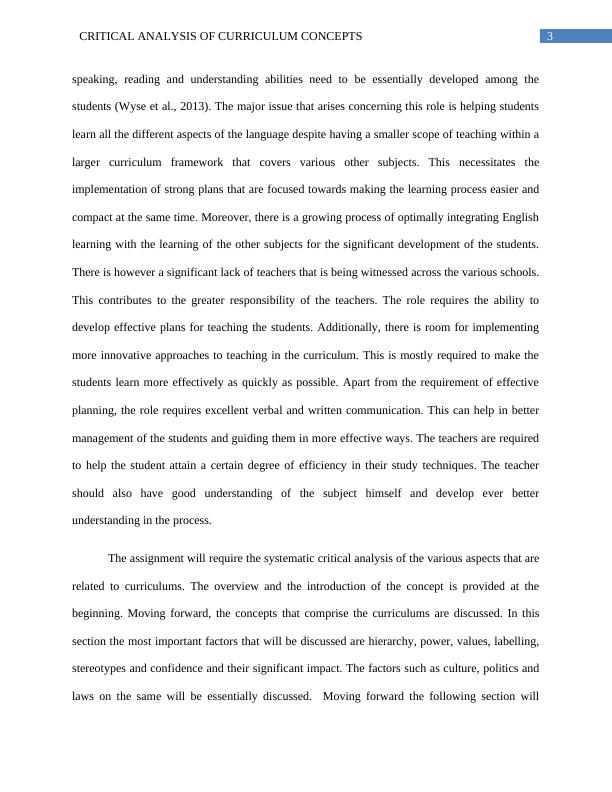
4CRITICAL ANALYSIS OF CURRICULUM CONCEPTS
discuss and analyze the professionalism factors within the specific setting of education. The
working and professional attitudes of the teachers will be discussed in this section. The critical
analysis of the specific research that have taken place in regards to the subject will be given
moving forward. The context and outcomes will be provided subsequently. How these outcomes
affect the roles of the teachers and the learning process implementations will be discussed. The
implications of the study will be provided in the conclusion section. The implications will be
derived through the systematic analysis and evaluation of the entire study. The implications will
be derived in accordance with its significance in regard to the study of the curriculum concepts.
This would be the structure on which the study will be essentially based.
Discussion of curriculum concepts
The concept of curriculum encompasses the significant aspects that are connected with
the development of effective and efficient learning process. Curriculum refers to the course of
study with regards to the specific branches of study. It is normally implemented across the major
schools and colleges. It comprises of the courses of the particular study that have been selected
in the level of the academic endeavor. Previously, the concept of teaching was mainly focused
towards cultivating the common needs of all rather than nurturing the unique needs of the
students. However, the modern dimension of curriculum focus more towards the experiences that
comprise the learning of the students (Van Hoorn et al., 2014). Hence, it is important to note that
the modern curriculums reflect the needs for the optimal development of the individuals. The
curriculum concept in the country is greatly governed through the policies of the government.
This means that the government engages in taking essential decisions for helping the optimal
development of the students. Hence, in the UK government policies to a great extent affect the
growth of the students. The concept of curriculum depends on the various aspects that lead to the
discuss and analyze the professionalism factors within the specific setting of education. The
working and professional attitudes of the teachers will be discussed in this section. The critical
analysis of the specific research that have taken place in regards to the subject will be given
moving forward. The context and outcomes will be provided subsequently. How these outcomes
affect the roles of the teachers and the learning process implementations will be discussed. The
implications of the study will be provided in the conclusion section. The implications will be
derived through the systematic analysis and evaluation of the entire study. The implications will
be derived in accordance with its significance in regard to the study of the curriculum concepts.
This would be the structure on which the study will be essentially based.
Discussion of curriculum concepts
The concept of curriculum encompasses the significant aspects that are connected with
the development of effective and efficient learning process. Curriculum refers to the course of
study with regards to the specific branches of study. It is normally implemented across the major
schools and colleges. It comprises of the courses of the particular study that have been selected
in the level of the academic endeavor. Previously, the concept of teaching was mainly focused
towards cultivating the common needs of all rather than nurturing the unique needs of the
students. However, the modern dimension of curriculum focus more towards the experiences that
comprise the learning of the students (Van Hoorn et al., 2014). Hence, it is important to note that
the modern curriculums reflect the needs for the optimal development of the individuals. The
curriculum concept in the country is greatly governed through the policies of the government.
This means that the government engages in taking essential decisions for helping the optimal
development of the students. Hence, in the UK government policies to a great extent affect the
growth of the students. The concept of curriculum depends on the various aspects that lead to the
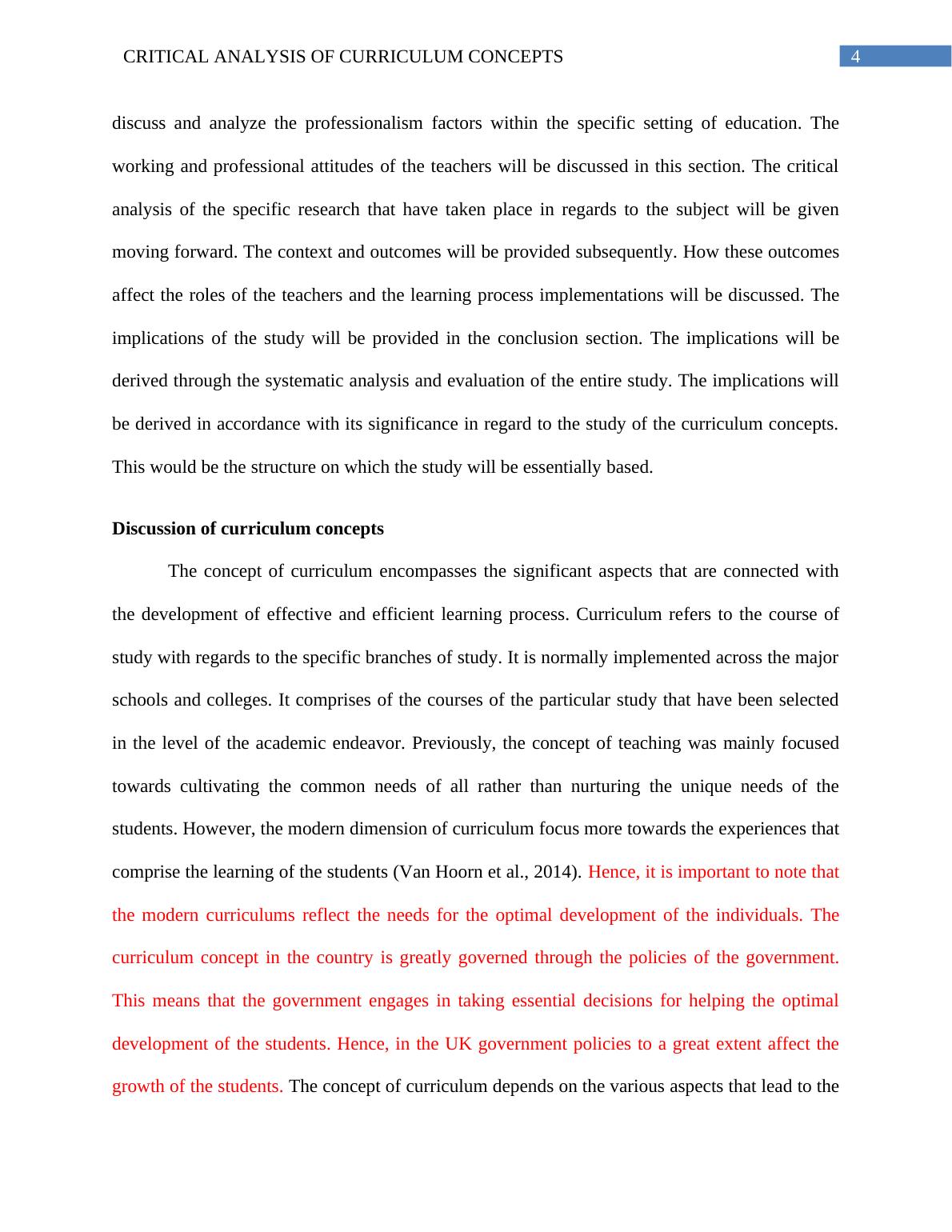
5CRITICAL ANALYSIS OF CURRICULUM CONCEPTS
essential growth of the students. It should be remembered that the growth of the learner is central
to the concept of the curriculum. According to Roberts (2000) education comprises of many
aspects that tend to affect its progress. It is based on how effectively in the holistic sense people
can learn more. However, curriculums although are based on the effective learning needs of
people, are affected greatly by the number of different factors. These factors range between
social, political, value oriented, power oriented and other essential factors. It is important that all
the significant factors are considered before understanding the significant concept of education.
According to the views provided by Paolo Friere in 1973, the education sector sometimes
gets affected by misconceptions. Education in today’s world can sometimes be equated with
banking which comprises of trying to drill certain information into the minds of the students
(Gadotti & Torres, 2009). The drilling takes place always in accordance with plans that are laid
by some other people. Hence, learners often get treated as objects rather than individuals. This
leaves a gap in learning that can negatively contribute towards the developmental aspects of an
individual. This creates a kind of a hidden curriculum and affects the education system in
general. As opined by John Dewey (1916) education is a social process. He further stated that
education is a process of living rather than preparing for the future. This greatly governs the
learning of the people and necessitates the proper implementation of curriculums across the
academic institutions.
Hidden curriculum is the unwritten, unintended and greatly unofficial values that students
can learn through the curriculums that are present in their schools (Alsubaie, 2015). The above
mentioned concepts can be greatly related to the concepts that concern hidden curriculums.
While formal curriculum is more concerned about the skills and knowledge the students can get
from the curriculum, hidden curriculum refers to the relation that the learners essentially develop
essential growth of the students. It should be remembered that the growth of the learner is central
to the concept of the curriculum. According to Roberts (2000) education comprises of many
aspects that tend to affect its progress. It is based on how effectively in the holistic sense people
can learn more. However, curriculums although are based on the effective learning needs of
people, are affected greatly by the number of different factors. These factors range between
social, political, value oriented, power oriented and other essential factors. It is important that all
the significant factors are considered before understanding the significant concept of education.
According to the views provided by Paolo Friere in 1973, the education sector sometimes
gets affected by misconceptions. Education in today’s world can sometimes be equated with
banking which comprises of trying to drill certain information into the minds of the students
(Gadotti & Torres, 2009). The drilling takes place always in accordance with plans that are laid
by some other people. Hence, learners often get treated as objects rather than individuals. This
leaves a gap in learning that can negatively contribute towards the developmental aspects of an
individual. This creates a kind of a hidden curriculum and affects the education system in
general. As opined by John Dewey (1916) education is a social process. He further stated that
education is a process of living rather than preparing for the future. This greatly governs the
learning of the people and necessitates the proper implementation of curriculums across the
academic institutions.
Hidden curriculum is the unwritten, unintended and greatly unofficial values that students
can learn through the curriculums that are present in their schools (Alsubaie, 2015). The above
mentioned concepts can be greatly related to the concepts that concern hidden curriculums.
While formal curriculum is more concerned about the skills and knowledge the students can get
from the curriculum, hidden curriculum refers to the relation that the learners essentially develop
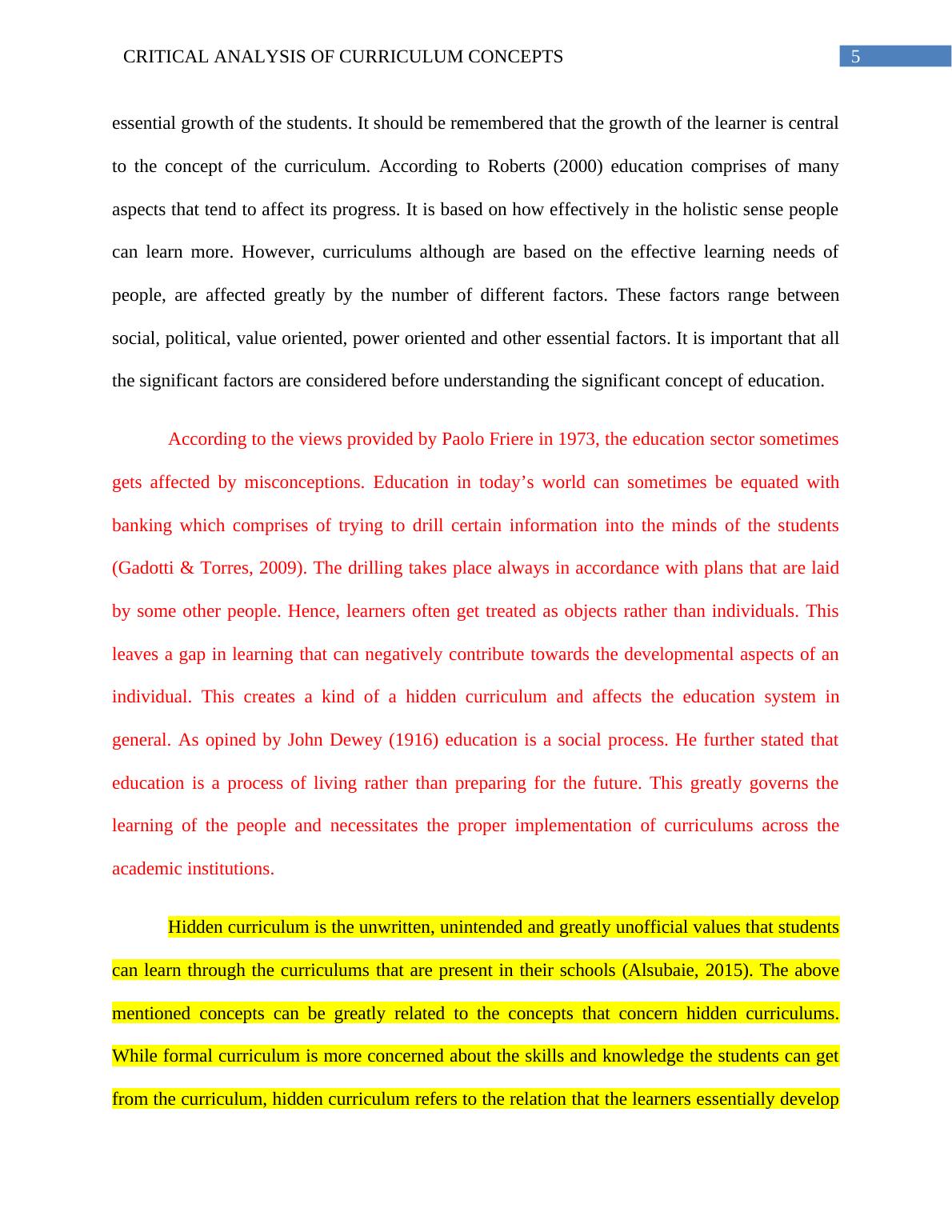
End of preview
Want to access all the pages? Upload your documents or become a member.
Related Documents
Critical Analysis of Curriculum and Pedagogy in Cambridge International Schoollg...
|8
|2580
|408
Importance of Humanities in Educationlg...
|6
|919
|316
Impact of National Curriculum on Primary Teacherslg...
|10
|2535
|1
Utilizing Concepts for Equality in Educationlg...
|8
|1885
|74
Reconstructing Curriculum in Mathematicslg...
|11
|3113
|81
Curriculum Development: Constraints and Resourceslg...
|6
|1187
|463
